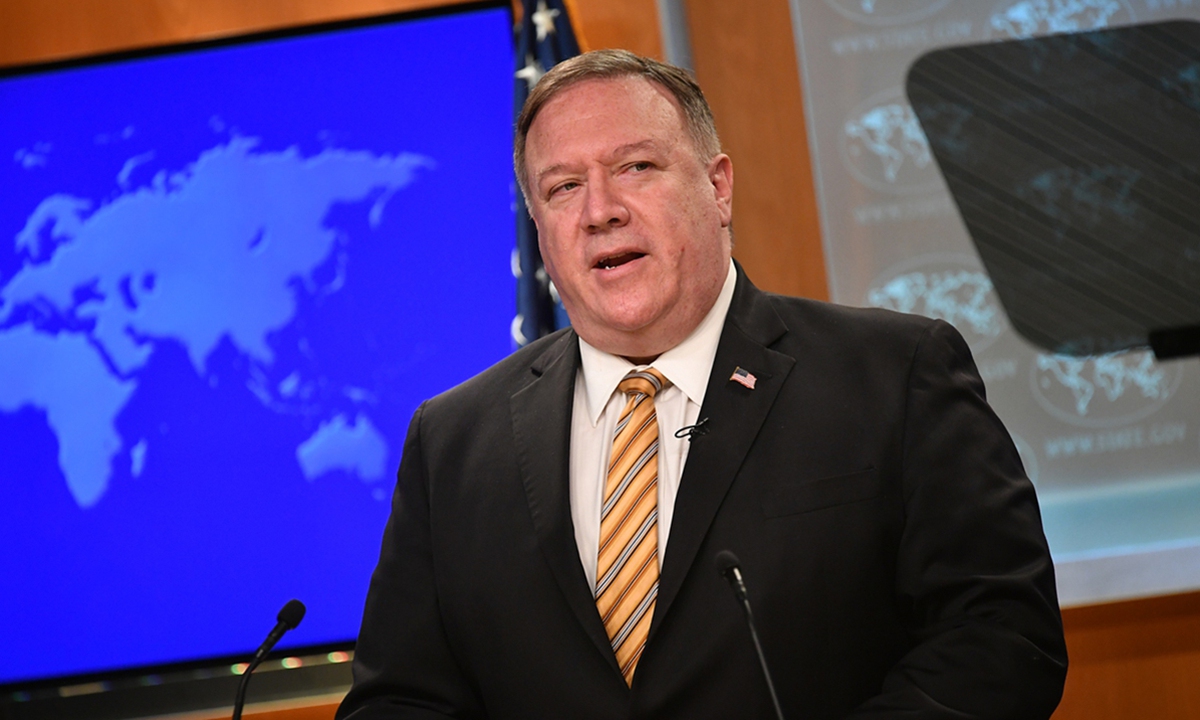Pompeo’s last-ditch provocation on Taiwan question leaves Biden a mess to fix: experts

US Secretary of State Mike Pompeo File photo: AFP
US Secretary of State Mike Pompeo, at the last moment of his term, has once again provoked China by saying that "Taiwan has not been a part of China," which is against the US' official stance and the foundation for China and the US in establishing their formal diplomatic ties, but Chinese experts said such a trick is unlikely to affect the policymaking of the new administration.
No matter what the final results of the US presidential election are, as Trump's legal challenges to Joe Biden's advantage are unlikely to change the current situation, the troublemaker-like Pompeo will have no chance to remain in the administration, and his crazy remarks on China's incontestable sovereignty over Taiwan is just another meaningless provocation. Therefore, China won't treat his words as a significant shift of US official stance, said analysts.
During an interview with US media, Pompeo said "Taiwan has not been a part of China, and that was recognized with the work that the Reagan administration did to lay out the policies that the United States has adhered to now for three and a half decades, and done so under both (Republican and Democrat) administrations," according to the website of the Department of State on Thursday.
Jin Canrong, Associate Dean of the School of International Studies at the Renmin University of China in Beijing, told the Global Times on Friday that Pompeo's words at the last moment of his term are actually directly opposite to the US' commitment to China and totally contradictory to the foundation for the two countries to build formal diplomatic ties.
"What he wants is probably to reinforce the anti-China hawkish image for himself and the Trump administration, and make some troubles for the new administration to fix the China-US ties," Jin said.
"It is extremely crazy for Pompeo to make the remarks, which have challenged China's bottom line on the Taiwan question," Ni Feng, director of the Institute of American Studies of the Chinese Academy of Social Sciences, told the Global Times.
These moves by the Trump administration are more like Trump venting his anger of re-election failure to China, and by denying the one-China principle, he could push China to the corner, further freeze China-US ties and leave one of the most negative legacies to Biden, Ni said.
According to Taiwan media, Xavier Chang, spokesperson of the office of Taiwan's regional leader, said on Friday that they have noticed Pompeo's remarks and personally echoed them by saying that Taiwan is a "sovereign state," further encouraging Taiwanese separatism.
However, Chinese mainland analysts said that the Taiwan separatist authority's stance is pointless and meaningless, and if Biden eventually takes office, the policy of the new US government will be mature and play by rules, even if he does still play the Taiwan card.
Pompeo's troublemaking won't bring too much pressure or impact to the new administration, and Biden won't let such a horrible politician ruin his policymaking, Jin said.
At this moment, for the Chinese mainland, in order to respond to Pompeo's wrong and provocative remarks, refutation is necessary, but for action, "we can just stick to what we are doing now to strengthen all capabilities for realizing reunification, and to prepare for any situation," Jin noted.
At Friday's regular press conference, Chinese Foreign Ministry spokesperson Wang Wenbin said Pompeo 's remarks - denying Taiwan island is a part of China - cater to his own political interests and aim to mislead public opinion, further undermining China-US ties and damaging cross-Straits stability.
A spokesperson with the Taiwan Affairs Office of the State Council also said Pompeo's remarks violated the commitment made by the US to China. Taiwan DPP's reliance on the US to fight against the mainland and seek secession, is a dead end, and its provocation by pursuing secession will only shoot itself in the foot, the spokesperson said.


